
THE VOICE OF INTERNATIONAL LITHUANIA
|
VilNews has its own Google archive! Type a word in the above search box to find any article.
You can also follow us on Facebook. We have two different pages. Click to open and join.
|
News

Wednesday, Feb 23, 2011
The United States is set to provide Lithuania with portable and fixed-location radiation sensors under a newly signed agreement to bolster joint work by the countries on combating illicit nuclear material transfers, the U.S. National Nuclear Security Administration announced yesterday (see GSN, Feb. 9, 2004).
The atomic agency would provide training to prepare Lithuanian personnel to spot, intercept and analyze radiological materials under the Implementation Agreement on Cooperation in Preventing Illicit Trafficking of Nuclear and Other Radioactive Material. The Lithuanian State Border Guard Service and the NNSA Second Line of Defense program since 2003 have pursued updates for radiation detection gear at certain facilities.
“Our continued partnership with Lithuania and this latest agreement represents our shared effort to prevent dangerous nuclear materials from falling into the hands of terrorists, smugglers and proliferators,” NNSA Deputy Administrator Anne Harrington said in a press release.
“By preventing terrorists or would-be proliferators from smuggling nuclear materials across international borders, we are working to implement President Obama’s unprecedented nuclear security agenda while promoting peace and security around the world”
- Bookmark :
- Digg
- del.icio.us
- Stumbleupon
- Redit it
The National Nuclear Security Administration (NNSA) and the Republic of Lithuania today announced that they have signed an Implementation Agreement on Cooperation in Preventing Illicit Trafficking of Nuclear and Other Radioactive Material. Lithuania’s State Border Guard Service under the Ministry of the Interior will work with NNSA to implement the agreement. The agreement was announced days after President Obama unveiled a budget request that includes $2.5 billion for Fiscal Year 2012 and $14.2 billion over the next five years to support NNSA’s nuclear nonproliferation programs.
Since 2003, NNSA’s Second Line of Defense (SLD) and the State Border Guard Service of Lithuania have been working to upgrade radiation detection equipment at select sites. Today’s agreement will expand that cooperation and strengthen the Lithuania’s capability to deter, detect, and interdict illicit trafficking in nuclear and other radioactive materials in the Baltic region. As part of this agreement, NNSA will provide the government of Lithuania radiation portal monitors, handheld radiation detectors and comprehensive training to assist front-line personnel to detect, interdict and identify radioactive material.
“Our continued partnership with Lithuania and this latest agreement represents our shared effort to prevent dangerous nuclear materials from falling into the hands of terrorists, smugglers and proliferators,” said NNSA Deputy Administrator for Defense Nuclear Nonproliferation Anne Harrington. “By preventing terrorists or would-be proliferators from smuggling nuclear materials across international borders, we are working to implement President Obama’s unprecedented nuclear security agenda while promoting peace and security around the world.”
The agreement will be implemented by NNSA’s Second Line of Defense (SLD) program, which works collaboratively with foreign governments at border crossings, airports, seaports, and other points of entry to install specialized radiation detection equipment and associated communications equipment. The SLD Program also provides training to host government border guard officials and other personnel to detect smuggled nuclear and other radioactive materials. NNSA has installed similar equipment at more than 400 sites in 50 countries around the world.
The FY 2012 budget request submitted to Congress earlier this week requests $2.5 billion in FY 2012 and $14.2 billion over the next five years to reduce the global nuclear threat by detecting, securing, safeguarding, disposing and controlling nuclear and radiological material, as well as promoting the responsible application of nuclear technology and science. It includes $263.8 million for the Second Line of Defense Program, highlighting the critical role NNSA and its nonproliferation programs play in implementing the President’s nuclear security agenda.
Source: NNSA
Source: http://www.yournuclearnews.com
- Bookmark :
- Digg
- del.icio.us
- Stumbleupon
- Redit it
BALTIC NUCLEAR FEAR
- Posted by - (2) Comment
![]()
NUCLEAR FEAR |
|
|
|
What exactly happened to the cargo ship ‘Arctic Sea’ that so strangely disappeared from the Baltic Sea last summer after allegedly having been ‘hijacked by pirates’? I’ve been fascinated by both the rumour mill and lack of a credible story surrounding the disappearance of this ship at the end of July 2009, and Russia’s announcement on the 18th of August that it had captured the ship and arrested eight men for hijacking it. While I’m hoping that some fearless media will throw serious resources behind this story and get to the bottom of it, I’m amazed it didn’t grab more attention last year. The mystery surrounding the ship still stands unresolved. How on earth could it be that a ship with a cargo of timber on the way from Finland to Algeria was 'kidnapped by pirates’ right in front of both the Finnish and Swedish Coast Guard? How could it happen that the ship was able to pass Polish, Swedish, Danish and German observation posts and coast guards on its way out of the Baltic Sea without being noticed? And how could the ship pass through the English Channel without being stopped, despite the fact that it, at this point, was internationally sought? Why was a Russian journalist called in the middle of the night and warned that he could be killed if he continued to investigate what had happened to the ship? And why was Israel suddenly involved? Why did such a flurry of diplomatic activity between Russia and Israel follow? Why did President Shimon Peres, unannounced, visit Moscow the same day the ship was finally found, west of Cape Verde in Africa? Why did Binyamin Netanyahu, the Israeli Prime Minister, make a secret trip to the Kremlin a few days later? Normally I don’t think much on conspiracy theories, but in this case there are simply too many strange events in a row to make me trust the official explanations. My personal theory is that the 'Arctic Sea' was supposed to test how effective Western Europe's control systems of its surrounding sea areas and straits are in reality. To me, the experiment showed that the control systems of our European waters are frighteningly deficient. If there were people or organizations with criminal intentions behind them, they now realize that they can do almost whatever they want with regard to reaching even the most prized European sea port without being noticed. What if a ship like the 'Arctic Sea' is loaded with a few ‘dirty’ nuclear bombs like those I have described above, in addition to lots of dynamite or other explosive devices? What if such a ship comes up the Thames towards London or up the Hudson River to New York? A ship with such a load blown up near one of these cities would in reality mean that the city would be laid waste for the foreseeable future, not to mention all the hundreds of thousands who would perish in an almost unimaginably horrible way. In 2005, the director of the CIA, Porter Goss gave a chilling assessment of the dangers posed by nuclear material that is missing from nuclear storage sites in Russia. Responding to a question from Sen. Jay Rockefeller, D-W.Va., about materials missing from Russian nuclear facilities, Goss said: "There is sufficient material unaccounted for, so that it would be possible for those with know-how to construct a nuclear weapon." Goss said he could not assure the American people that the missing nuclear material had not found its way into terrorists' hands. Today's difficult economic times in the Baltic States is likely contributing to cases with officials within the police and customs services now more than ever open to 'suggestions' that gives them some additional income, and I consider therefore that the horror scenarios described above may well be more imminent than ever. We already know that there are people and organizations along Russia's southern border that are more than willing to take human lives for their causes.
Is what I've written above excerpts from a bad crime novel? Unfortunately not.
Aage Myhre, Editor |
- Bookmark :
- Digg
- del.icio.us
- Stumbleupon
- Redit it
Municipal elections Sunday 27 February: Use your voice to push for new impetus for Lithuania
- Posted by - (0) Comment
|
|
|
|
|
|
|
|
|
|
Text: Evelina Gudzinskaitė.
27th of February is the day of municipal elections in Lithuania. Will you be there?
If you have spent a winter in Lithuania, you will probably know what a flu virus is. It is very contagious, and one must be really careful or very strong in order to remain healthy throughout the winter. But there is another virus, a more dangerous one, because it persists, it changes shapes, it infects one in various ways and it can corrupt even the healthiest organisms. It is a virus of scepticism.
Local people are just not happy with their country, their surroundings, their neighbours, their lives in general. The biggest part of debates or monologues in the media is of a pessimistic, criticizing nature. Each positive news gets lost easily and is forgotten. And then, everyone knows that an article which mashes someone into dust gives one more points in political career, so why bother in trying to create healthy atmosphere?
But why do I call it a virus? Because it contaminates almost every newcomer. You can observe how a foreigner comes here with big or smaller aims to create something big, something useful, to give something for this country. She or he radiates incentive, spreads ideas, suggestions, how to improve the administration of the country, how to make people happy. Then with time such radiation diminishes. Suddenly you hear that life is not so simple here (after a year or so), that it is quite complicated (after a couple of years), that it is very difficult and needs some major improvements (after five years). Then you can state that the foreigner has melted with local inhabitants: she or he complains, but does nothing in order to change at least a thing. And justifications are similar: “what can I do? I’m just a foreigner...”
Well actually you foreigners can do something. You can elect people into local municipal councils or even participate in the elections. You CAN participate in governing the town or village where you live. We even amended our Constitution in order to let you do it!
In 2007, when the economy was booming and people were confident that life would get even better, 25 foreigners decided to participate in the municipal elections. It could not be because of their failure to win that this time we have only one foreigner, a citizen of Poland, who decided to enter elections to the Vilnius municipal council. Such shrinking in foreigners’ participation number must be caused by this virus, this disbelief that something could be changed in Lithuania.
Indeed, it seems that after every elections situation worsens. But maybe this time will be different? Many candidates believe so and are ready to work for a common good. It is now up to the voter to elect the right councillors. However, it won’t be an easy task, as these elections offer huge variety of personalities and political streams.
Will foreigners dare to take part in this game and share responsibility?
Eligibility requirements
Let’s just make a short break and check whether you (if you are a foreigner) meet the election requirements. Not every foreigner can vote or participate in the elections – only those who are permanent residents of Lithuania. The status of a permanent resident is granted after 5 years of continuous legal residence in Lithuania. So check, what document you have:
- If you are a citizen of the EU or Norway, Iceland, Switzerland or Lichtenstein, you must possess either a card named “Permanent residence permit of a citizen of a member state of the European Communities” (Europos Bendrijų valstybės narės piliečio leidimas gyventi nuolat; these cards are not issued anymore), or a certificate confirming the right of the EU citizen to permanently reside in Lithuania;
- if you are a family member of a citizen of the EU or one of those other 4 countries, you must have either a card named “Permanent residence permit of a citizen of a member state of the European Communities” (Europos Bendrijų valstybės narės piliečio leidimas gyventi nuolat; these cards are not issued anymore) or a card with a title “Residence permit of a family member of a citizen of an EU member state in the Republic of Lithuania” (Europos Sąjungos valstybės narės piliečio šeimos nario leidimas gyventi Lietuvos Respublikoje), which is valid for 10 years;
- if you are not such family member and you are a citizen of a so-called third country, you must have a permanent residence permit in the Republic of Lithuania (to be a long-term resident of the European Community).
If you don’t know what municipality you belong to, you can find it here by entering the address of your declared (official) place of residence in Lithuania. If you didn’t receive the voter’s card, you can obtain it from here. So it’s simple: you take this voter’s card, your passport or an ID card, find the place where the voting will take place, and visit it on the 27th of February. Well, you also have to understand some Lithuanian – in order to mark the correct party or candidate.
And some information for the future: foreigners can also participate in the elections themselves. Foreigners cannot be members of Lithuanian political parties, but they can be included into lists of political parties as non-party candidates or they can nominate themselves as independent candidates to the municipal councils. In order to become an independent candidate, a person must collect a certain amount of voters’ signatures (this amount varies from municipality to municipality, and it is calculated by the Central Electoral Commission). The municipal councillor is the highest governmental position that a foreigner can obtain in Lithuania – the posts of mayors and vice-mayors are reserved to Lithuanian citizens.
There are more than 20 thousand foreigners in Lithuania who are permanent residents. Having excluded minors we still get a significant number of voters who can bring in their own views on how municipalities should be governed.
What choices do we have?
During first elections people mostly voted for traditional parties. When these parties didn’t bring expected changes, people started looking for other “saviours” (although the traditional parties maintained their electorates). First, various new parties started emerging; usually they had a famous leader, but other members were not well known in the society. Such was the Labour Party (Darbo partija), founded in 2003 by a Russian millionaire Viktor Uspaskich (now suspected for tax fraud), or the party “Order and Justice” (“Tvarka ir teisingumas”), founded in 2002 by Rolandas Paksas (a politician who twice resigned from the post of the Prime Minister, a former mayor of Vilnius during whose term of office Vilnius municipality started sinking into debts, and finally a president who was impeached for breaching the Constitution of Lithuania – just to mention a few of his resignations and removals).
When people became disappointed of all politicians in general, various TV stars or controversial personalities entered the political arena. As they justified their names and didn’t transform themselves into real politicians, it is unlikely that they would be re-elected. For example, the Party of National Revival (Tautos prisikėlimo partija), composed of various actors, musicians, TV stars, etc., was created just before the Parliamentary elections in 2008, and won 16 seats in the Parliament (out of 141). However, after various internal quarrels and splits, it lost its political weight, and for the coming municipal elections it presented its lists of candidates for only 8 municipalities (out of 60). It didn’t even bother to create some common electoral programme.
The upcoming municipal elections are particular by the fact that it will be the first time when individual candidates, who do not belong to any political party, will be able to participate in the municipal elections. Therefore these municipal elections present as colourful bouquet of candidates as ever: together with the political parties, one sees various social movements and independent candidates; besides, the list of participating stars is refreshed by new artists and sportsmen. It seems that even the most eccentric voter should now be able to find her or his favourite candidate.

There are more than 17 thousand candidates who wish to obtain one of the 1 526 mandates; more than 11 thousand of them have never participated in elections before, 60% have higher education. Average age of candidates is 46. For the first time, the number of participating women (more than 7 thousands) almost came up with the number of participating men. Almost 300 participants are millionaires.
More than 200 candidates confessed about their previous convictions (usually for minor breaches of law), and the Central Electoral Commission already established that almost 250 other candidates have concealed the information on their previous convictions (they will be removed from the elections). Voters will be informed about the candidates with previous convictions by special remarks under their photographs in places of voting.
More than 20 members of the Parliament and 3 members of the European Parliament entered their names on top of candidates’ lists. It is unlikely that they seriously intend to change their mandates; however, their names will attract more votes for the party.
There are 23 political parties, 11 parties’ coalitions, 515 independent candidates and 39 coalitions of independent candidates.

One can notice that the main slogan of many coalitions of independent candidates is “we are different than them, political parties”. Just look into their titles: Coalition “Different Lithuania” (“Kitokia Lietuva”), Coalition “We – Non-party Returned Emigrants” (“Mes – nepartiniai grįžę emigrantai”), Coalition “Differently” (“Kitaip”), Coalition “For Changes” (“Už pokyčius”), etc. Also the word “non-party” dominates in their language; check, for example, the Coalition of Non-party Candidates “Vilnius – Our Business” (“Vilnius – mūsų reikalas”), who decided to bury political parties; Coalition of Artūras Zuokas and Vilnius, supported by A. Zuokas’ (former controversial mayor of Vilnius) social movement “Yes!” (“Taip!”), who stresses that non-belonging to any political party allows candidates to remain professional (although A. Zuokas himself and some other candidates were previously successful members of political parties); Coalition “United Kaunas” (“Vieningas Kaunas”) promises to work instead of talking and remain decent, etc.

Taip!
So the traditional political parties have many troubles in trying to maintain their electorate. First of all because some of their own members do not believe in them and decide to follow the local popular trend – to change political parties, sometimes choosing completely opposite political views. Second of all, because people continue blaming the government for all the misfortunes that they experience, for the fact that situation in Lithuania does not compare to the situation “out there” (in the West), forgetting that the government represents the political will of the people. And also because the traditional political parties represent the three main political streams, which for some people today associate with three main political ways of lying.
It will be particularly difficult for the conservatives, the Homeland Union – Lithuanian Christian Democrats (Tėvynės Sąjunga – Lietuvos krikščionys demokratai). They had a misfortune to win the parliamentary elections in 2008 (received 45 mandates), when Lithuania was ready to jump deep down into the ocean of economic crisis. In order to save the country from a possible bankruptcy, they had to make a lot of unpopular decisions. This caused dissatisfaction of various groups of society who used to receive social and financial benefits from the state, but also of businessmen, because their tax burden was increased even more. These municipal elections will be a real test of the loyalty of the conservatives’ electorate.
Exactly this diminishing popularity of the conservatives seems promising to the socialists, first of all, the Lithuanian Social Democratic Party (Lietuvos socialdemokratų partija). They safely spent the most difficult time of the economic crisis in the opposition (the biggest group of opposition, 24 mandates in the Parliament), criticising the reforms without providing constructive alternatives, so they created an image of fighters against injustice. Besides, their campaign promises sound very sexy: “The state of common welfare has no place for poverty, unemployment, social inequality, violations of human rights. Economic reforms are never made at the expense of social justice of people”. Who wouldn’t vote for that? However, if people remember that this political party has the biggest number of mayors (17) in the present municipal councils, when the level of corruption and inactivity continues rising in many municipalities, they might reconsider their choice.
A liberal party, the Liberals’ Movement of the Republic of Lithuania (Lietuvos Respublikos liberalų sąjūdis), is in a peculiar situation in this context. Although forming a part of position in the Parliament (13 mandates), they have to agree with some decisions which contradict the liberal ideology. However they succeeded in implementing some of their ideas, especially in those areas which fall under the competence of the liberal ministers (minister of education and science, minister of transport and communications and minister of justice). It seems that their electorate agrees with the liberals’ programme, and the support for the Liberals’ Movement is steadily growing.
What outcome can we expect?
It may seem strange that, while talking about municipal elections, I look into the situation at the national, parliamentary level. Well it is not strange at all. There is still a big lack of understanding about the functions and role of the municipalities. Many people often forget that the municipal administrations are responsible for various issues which directly influence the surroundings of inhabitants, and often require the Parliament to solve issues which actually fall under the competence of municipalities. And vice versa – while electing municipal councillors, people expect them to increase salaries, pensions and reduce taxes, which could be done only at the national level.
Thus many people will look at the Parliament and decide whom to vote for in these municipal elections. And the participants in the elections are aware of that. Therefore they spread many promises which would never be implemented exactly because the municipalities don’t have the power to do so. Besides, political parties use these municipal elections as a test platform for the upcoming parliamentary elections in 2012.
Actually, just a few people care about reading electoral programmes. Most of people will vote for personalities, their favourite political streams or – as it happened in the past – for some marginal personalities or movements just for the fun of it.
One Lithuanian right-wing weekly magazine, “Veidas”, asked various experts in law, economics, political science, sociology and territorial government to evaluate electoral programmes. The experts noted that the programmes were mostly filled with slogans, vain expressions, such as “we will aim at”, “we will strive for”, without explaining how this would be done, where the funds would be taken from, etc. The experts gave marks for the electoral programmes, taking into account their feasibility, intellectual potential and professionalism.
The highest mark 8 (out of 10) was given to the Liberals’ Movement of the Republic of Lithuania (so this party did have the reason to choose their slogan “Liberals – the rights of sensible mind” (“Liberalai – sveiko proto dešinieji”)) and the conservatives, the Homeland Union – Lithuanian Christian Democrats. The second best mark 7,5 was given to a central party New Union (Social liberals) (Naujoji sąjunga (socialliberalai)), a socialist party Union of Social Democrats of Lithuania (Lietuvos socialdemokratų sąjunga) and a right-wing party the Lithuanian Peasant Popular Union (Lietuvos valstiečių liaudininkų sąjunga).

To resume, the choice of candidates and ideas is immense. However not all of candidates would be willing or capable to keep their promises. Just a minority has experience how the governing should be done; others will have to learn in the process. With no doubt, independent candidates will have to form coalitions with major political parties in individual municipalities and lose their “politics-free” pose; otherwise they would not be able to implement their vision.
The outcome of the elections will also very much depend on who will come to vote. Usually the voters’ participation rate is not high, especially among younger people. In order to increase the participation of the youth, the Liberals’ Movement had suggested introducing the possibility to vote in these municipal elections by internet; however, this idea was rejected by other political parties. And one can only guess whether they did it because of the fear that Lithuania is not ready for the e-voting, or because of the fact that their electorate is more mature and would not use the e-voting possibility anyway.
Let’s hope that these municipal elections will be a peak of political variety and experiments and that the next elections (to the Parliament) will be considered more seriously and responsibly.
A big educational work should still be carried out. People should learn to read the political language, to follow history, to connect consequences with the real reasons, and to understand that the civil society can govern not only by entering municipal councils or the Parliament, but also by demanding responsibility from the elected ones.
Foreigners could also do their part, by getting involved more in the municipal lives, by sharing their experience, points of view and by helping to create nicer environment for everyone.
So, will you be there on the 27th of January?
Sources of reference: www.lrs.lt, www.vrk.lt, www.delfi.lt, www.lrt.lt, www.veidas.lt
- Bookmark :
- Digg
- del.icio.us
- Stumbleupon
- Redit it

Source Andy Potts at 24/02/2011
Soviet president Mikhail Gorbachev attempted to hold Lithuania to ransom over its bid for independence in 1990, according to recently declassified files.
Documents by Swedish consul Dag Sebastian Alander, who was working in Leningrad at that time, say Gorbachev called for the payment of 21 billion roubles (about $126 billion according to the unofficial exchange rate of the time) and the transfer of the Klaipeda region to the Russian Soviet republic, delfi.lt reported.
The documents detail a meeting on March 9, 1990, in which Gorbachev apparently agreed to let Vilnius follow its own course – at a price.
No deal was struck at that time, and Lithuania eventually won its independence in Aug. 1991, a few months before the official collapse of the USSR.
- Bookmark :
- Digg
- del.icio.us
- Stumbleupon
- Redit it
Maxima for sale?
- Posted by - (0) Comment
![]()
Several media reports this week that Yelena Baturina, wife of former Moscow Mayor Yury Luzhkov, is one of several interested parties to buy Lithuania-based retailer Maxima Group, the biggest Baltic retail chain with 437 shops in Lithuania, Latvia, Estonia and Bulgaria.
- Bookmark :
- Digg
- del.icio.us
- Stumbleupon
- Redit it
![]()
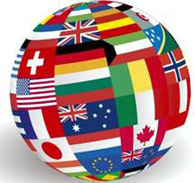
USA and Lithuania were over the last week competing every day about being the leading nation among our VilNews readers. Last night, however, USA made a rather big jump up and is now clearly ahead of Lithuania. These two countries are, by the way, in a league of their own, representing 70% of our total readership. These are the figures of the day:
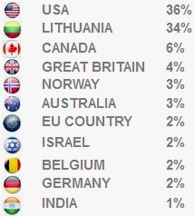
On the places after India follow:
Japan, Ireland, France, Sweden, Denmark, Hong Kong, Russia, Portugal, Latvia, Finland, Kenya, Spain, South Africa and the Czech Republic.
We have also readers in countries like:
Argentina, Qatar, Kyrgyzstan, Afghanistan, Kazakhstan, Indonesia, Thailand, China, Colombia, Malaysia, Trinidad and Tobago.
Lithuania-lovers in absolutely every corner of the world, in other words...
- Bookmark :
- Digg
- del.icio.us
- Stumbleupon
- Redit it
- Posted by - (0) Comment

Foreign trade 2010:
Exports increased by 33.2% and imports by 34.5%.

The increase in exports was influenced by a 49.4 per cent increase in exports of petroleum products.
Exports in 2010 amounted to LTL 54.3 billion, imports – LTL 60.9 billion. Foreign trade deficit of Lithuania amounted to LTL 6.6 billion, which is 45.8% more than in 2009. The increase in exports was influenced by a 49.4 per cent increase in exports of petroleum products, 46.7 per cent – ground vehicles, 41 per cent – boilers, machinery and mechanical appliances. The increase in imports was influenced by a 50.2 per cent increase in imports of crude petroleum, 68.4 – ground vehicles, 42 per cent – electrical machinery and equipment and parts thereof.
In 2010, the most important partners in exports were Russia (15.6 per cent), Germany (9.8 per cent), Latvia (9.6 per cent) and Poland (7.7 per cent), in imports – Russia (32.6 per cent), Germany (10.9 per cent), Poland (8.8 per cent) and Latvia (6.3 per cent).
Read more...
Unemployment increases, up 4.2% to 17.8% in 2010
The good news, however, is that there were some improvements to see at the end of the year.
Read more...
Consumer goods and services up 1,6% last month
Over the last year, changes in prices for housing, water, electricity, gas and other fuels group of goods and services were mostly determined by a 14.9 per cent increase in prices for solid fuel, 5.1 per cent – liquefied gas for cooking, as well as by a 6.2 per cent price drop in prices for natural gas. In 2011, the annual inflation (January 2011, against January 2010) stood at 2.9 per cent. The Over a year, prices for consumer goods grew by 3.9 per cent, while prices for services dropped by 0.2 per cent.
Read more...
- Bookmark :
- Digg
- del.icio.us
- Stumbleupon
- Redit it
Guggenheim rejects Vilnius as new museum site – fraud investigations seem to follow
- Posted by - (1) Comment
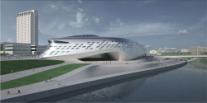
The Guggenheim Museum was planned built here at River Neris in Vilnius.
After years of planning and excitement among the European Arts community, corruption is cited as the cause for The Guggenheim Museum Initiative to no longer considering Vilnius, as the site for the new regional art museum.
Led by the National Audit Office, allegations are being levelled at groups within the Vilnius municipal government for misappropriating funds which were to be used for a feasibility study regarding the building of the museum and related facilities.
The Hermitage/Guggenheim Vilnius Museum was to be designed by Zahos Hadid, an Iraqi architect with a firm in London- the futuristic design would have been built next to the Neris River, along the White Bridge. Helsinki is now awarded the honour.
Source: http://www.shortnews.com
- Bookmark :
- Digg
- del.icio.us
- Stumbleupon
- Redit it
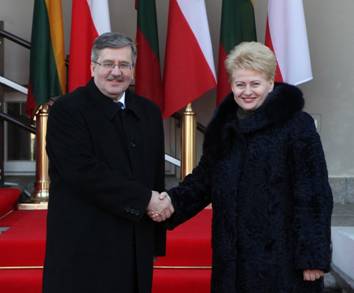
Lithuanian President D. Grybauskaite and Polish President B. Komorowski at the celebration of Lithuania’s Independence Day, 16 February
As Polish President Bronislaw Komorowski participated in Lithuanian Independence Day celebrations in Vilnius on the 16th of February, a Polish MEP has called for an immediate improvement in what have been rocky relations between the two neighbours of late. This is the first official visit to Lithuania by Bronislaw Komorowski since he was elected head of state last summer.
President Komorowski was taking part in the main Independence Day ceremony in Vilnius and was also laying a wreath at a memorial to 100,000 Poles, mostly Jewish, who were murdered by German Nazi occupiers and Lithuanian collaborators in the Vilnius’ suburb of Panerai between 1941 and 1944.
According to unofficial sources, Polish Radio had been told that President Komorowski would use a meeting with Lithuanian head of state Dalia Grybauskaitė to raise concerns over the situation of the Polish minority in Lithuania.
- Bookmark :
- Digg
- del.icio.us
- Stumbleupon
- Redit it
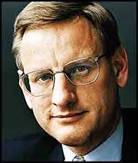
Carl Bildt, Sweden’s Foreign Minister
Sweden will unseal classified diplomatic files dealing with the 1991 collapse of the Soviet Union, Foreign Minister Carl Bildt says.
"We will do something that has really never been done before in Sweden: declassifying an important part of the foreign ministry's archive," Bildt wrote on his official blog this week.
"We're talking about virtually all of our up-until-now secret reports from the collapse of the Soviet Union and the Baltic freedom movement under the dramatic year 1991," he added.
Foreign ministry spokesman Anders Jörle told AFP the documents to be unsealed were diplomatic notes from Swedish envoys posted in the Baltic countries and the city of Leningrad, now Saint Petersburg, at the end of the Soviet era.
- Bookmark :
- Digg
- del.icio.us
- Stumbleupon
- Redit it
 Three Lithuanian men who robbed a Co Westmeath jewellery store in Ireland while under duress from a Lithuanian criminal gang were this week told to return to Lithuania or face five years in prison.
Three Lithuanian men who robbed a Co Westmeath jewellery store in Ireland while under duress from a Lithuanian criminal gang were this week told to return to Lithuania or face five years in prison.
Egidijus Peciulis (30), from Joncua, Gytis Zienius (35) and Ovidijus Rumba (30), both from Kaunas, admitted robbing almost €94,000 in rings from Angela Blacoe Jewellers in Athlone on March 6th, 2010.
Judge Anthony Kennedy said at Mullingar Circuit Court it was accepted the three acted under duress “from start to finish”. A “controlling mastermind” had a “terrifying command” over them.
Passports were taken from the men, and they were told their lives and the lives of their families were in danger if they did not commit the robbery, the court was told.
The men used pepper spray on Valerie Byrne, a jewellery shop customer, and staff member Theresa Carey during the raid. None of the jewellery was ever recovered.
Peciulis claimed he had been promised construction work in Ireland, but when he arrived a man took his passport and told him to commit the robbery. His life and his family were under threat.
Judge Kennedy noted the concern of the DPP that “it would send the wrong message that if runners, stooges are caught in Ireland all that would happen to them is that they would be deported”.
However, he believed the criminal “bosses” would not care “one way or the other” what happens to the “underlings”.
He imposed five-year prison sentences on the trio backdated to March 10th. The remainder of the sentences was suspended on condition they return to Lithuania and stay out of Ireland for 10 years.
- Bookmark :
- Digg
- del.icio.us
- Stumbleupon
- Redit it
16 February 1918 was the day Lithuania again could declare its independence – after 123 years of Russian occupation
- Posted by - (0) Comment
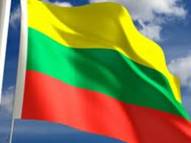 It was a sunny yet frosty winter day, 16 February, this year. Lithuania celebrated its independence. Because t was on this very day in 1918 that 20 members of the Council of Lithuania, headed by Dr. Jonas Basanavičius signed the Act of Independence. 93 years (nearly a century!) have passed since that time.
It was a sunny yet frosty winter day, 16 February, this year. Lithuania celebrated its independence. Because t was on this very day in 1918 that 20 members of the Council of Lithuania, headed by Dr. Jonas Basanavičius signed the Act of Independence. 93 years (nearly a century!) have passed since that time.
Sadly, Lithuania stayed independent only 22 years after 1918, and disappeared from the political map of Europe due to German and Soviet occupation for the period 1940-1990. Yet the memory about significance of February 16th still remains close to our people`s hearts.
Some very sad news happened 16 February this year when one of the most prominent modern Lithuanian poets, Justinas Marcinkevičius, died at the age of 81. As patriot and humanist, Justinas Marcinkevičius was a remarkable figure in the Sąjūdis movement for Lithuanian Independence. His death is a great loss for Lithuania and it`s people.
During the celebration of the Independence Day, current president of Lithuania, Dalia Grybauskaite, and other state officials attended a ceremony at the Rasos Cemetery in Vilnius to honour the memory of the deceased signatories of the Act of Independence.
According to the tradition, however, the main commemorating event took place by the House of Signatories in Pilies Street, where the Act of Lithuania`s Independence was signed. Hundreds of people of different age and background gathered, despite the blessing of extremely low temperatures.
Read more at our
Section 9 – LITHUANIA TODAY
- Bookmark :
- Digg
- del.icio.us
- Stumbleupon
- Redit it
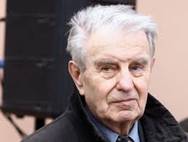 Justinas Marcinkevičius (10 March 1930 - 16 February 2011), the prominent poet and playwright, just died. Having grown up during the post-war period, Marcinkevičius evoked in his poetry a romanticized version of childhood spent in the Lithuanian countryside, of first love, of man`s relationship with nature. In his poetry specific and solid peasant thinking was combined with a mind seeking to draw broad general conclusions, and the tradition of Lithuanian poetry singing the Earth`s praises with contemporary modes of poetic thought. As a poet, he sought to grasp the essence of national experience and give it fresh artistic expression. Justinas Marcinkevičius was regarded as one of the most prominent members of the Sąjūdis movement.
Justinas Marcinkevičius (10 March 1930 - 16 February 2011), the prominent poet and playwright, just died. Having grown up during the post-war period, Marcinkevičius evoked in his poetry a romanticized version of childhood spent in the Lithuanian countryside, of first love, of man`s relationship with nature. In his poetry specific and solid peasant thinking was combined with a mind seeking to draw broad general conclusions, and the tradition of Lithuanian poetry singing the Earth`s praises with contemporary modes of poetic thought. As a poet, he sought to grasp the essence of national experience and give it fresh artistic expression. Justinas Marcinkevičius was regarded as one of the most prominent members of the Sąjūdis movement.
- Bookmark :
- Digg
- del.icio.us
- Stumbleupon
- Redit it
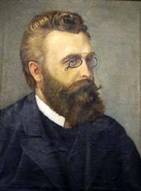 Jonas Basanavičius (23 November 1851 – 16 February1927), the father of Lithuania`s independence declaration in 1918, also died on 16 February. He was an Ideologist of Lithuanian national movement, the founder and editor of the first prohibited newspaper of national revival Ausra (The Dawn). One of the initiators and the Chairman of the Organizing Committee behind the Lithuanian Science Society in 1907. He wrote about 40 works on history, archaeology, cultural history, ethnography, folklore studies, linguistics and medicine.
Jonas Basanavičius (23 November 1851 – 16 February1927), the father of Lithuania`s independence declaration in 1918, also died on 16 February. He was an Ideologist of Lithuanian national movement, the founder and editor of the first prohibited newspaper of national revival Ausra (The Dawn). One of the initiators and the Chairman of the Organizing Committee behind the Lithuanian Science Society in 1907. He wrote about 40 works on history, archaeology, cultural history, ethnography, folklore studies, linguistics and medicine.
- Bookmark :
- Digg
- del.icio.us
- Stumbleupon
- Redit it
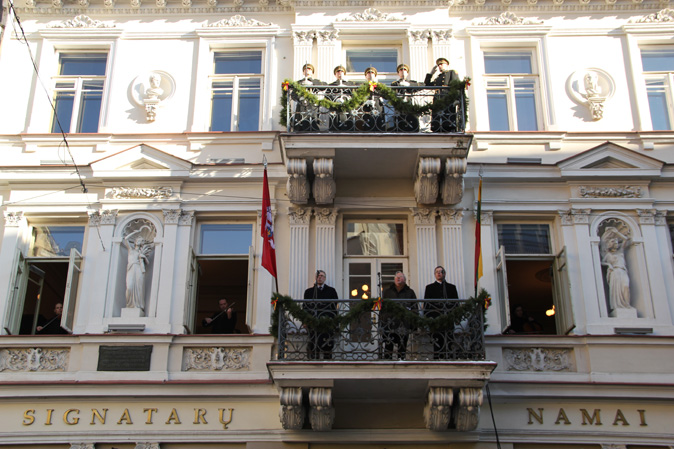
Text: Diana Koval
On a sunny yet frosty winter day, 16 February, Lithuania celebrated its independence. It was on this very day in 1918 that 20 members of the Council of Lithuania, headed by Dr. Jonas Basanavičius signed the Act of Independence. 93 years (nearly a century!) have passed since that time.
Sadly, Lithuania stayed independent only 22 years after 1918, and disappeared from the political map of Europe due to German and Soviet occupation for the period 1940-1990. Yet the memory about significance of February 16th still remains close to our people’s hearts.
Some very sad news happened 16 February this year when one of the most prominent modern Lithuanian poets, Justinas Marcinkevičius, died at the age of 81. As patriot and humanist, Justinas Marcinkevičius was a remarkable figure in the Sąjūdis movement for Lithuanian Independence. His death is a great loss for Lithuania and it‘s people.
During the celebration of the Independence Day, current president of Lithuania, Dalia Grybauskaite, and other state officials attended a ceremony at the Rasos Cemetery in Vilnius to honour the memory of the deceased signatories of the Act of Independence.
According to the tradition, however, the main commemorating event took place by the House of Signatories in Pilies Street, where the Act of Lithuania’s Independence was signed. Hundreds of people of different age and background gathered, despite the blessing of extremely low temperatures.
Some of them came right from the solemn High Mass which was held at the Vilnius Cathedral. The event started with a recitation poem by Justinas Marcinkevicius “Singing Lithuania”. As always, professor Vytautas Landsbergis, spoke from the balcony, expressing sorrow and sadness due to death of the great poet of Lithuania.
He also pointed out that people should strengthen their conscience in order to keep Lithuania a strong and resilient country. After the speech of professor Landsbergis, everyone sang the National Hymn of Lithuania accompanied by a String Quartet.
It was a truly great feeling to be there, surrounded by hundreds of small flags and smiling people, realizing that we all, after all, live in a free, independent country!
- Bookmark :
- Digg
- del.icio.us
- Stumbleupon
- Redit it
VilNews e-magazine is published in Vilnius, Lithuania. Editor-in-Chief: Mr. Aage Myhre. Inquires to the editors: editor@VilNews.com.
Code of Ethics: See Section 2 – about VilNews. VilNews is not responsible for content on external links/web pages.
HOW TO ADVERTISE IN VILNEWS.
All content is copyrighted © 2011. UAB ‘VilNews’.

 Click on the buttons to open and read each of VilNews' 18 sub-sections
Click on the buttons to open and read each of VilNews' 18 sub-sections 


























.jpg)



